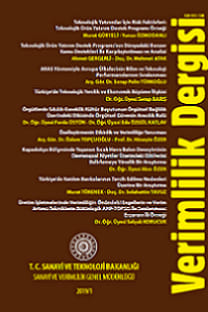TEDARİK ZİNCİRİ FİNANSMANININ KOBİ'LER ÜZERİNDEKİ OPERASYONEL VE FİNANSAL ETKİLERİ
Tedarik zinciri finansmanı kavramı, 2008'de yaşanan finansal krizin doğurduğukredi darboğazından çıkmak adına, pek çok KOBİ için yeni bir çözümönermektedir. Avrupa'da özellikle son dönemlerde hızla büyümesi ve genişuygulama alanları bulmasına rağmen, bu konuda yapılan teorik ve ampirikakademik çalışmaların sayısı oldukça sınırlıdır. Tedarik zinciri finansmanıuygulamalarının KOBİ'lere olan etkisinin kapsamlı bir biçimde analiz edilmesi,bu şirketlerin kısa vadede daha etkin finansal planlama yapabilmesine vedeğer yaratma süreçlerinin verimliliğinin artmasına katkıda bulunacaktır.Bu çalışmanın amacı, tedarik zinciri finansmanı uygulamalarının KOBİ'lereolan finansal ve operasyonel faydalarını açıklayan bir model oluşturmak ve buçerçevede tedarik zinciri finansmanının KOBİ'lerin ödeme sürelerine olan etkisiniincelemektir. Bu açıdan tedarik zinciri finansmanının sermaye maliyetine olanetkisi ve operasyonel faydaları modellenecektir. Tedarik zinciri finansmanınınuzun vadeli ve stratejik faydaları bu çalışmanın dışında tutulmuştur. Buaraştırma sonunda elde edilen akademik bulgular, tedarik zinciri finansmanıkonusunda firma yöneticilerine önemli ölçüde yol gösterecektir. Ayrıca,düzenleyici ve denetleyici kurumların da araştırma bulgularından istifadeetmesi umulmaktadır.
THE OPERATIONAL AND FINANCIAL IMPACTS OF SUPPLY CHAIN FINANCE ON SME'S
The concept of supply chain finance offers many solutions to SME's that hasbeen pushed for cash since 2008 global financial crisis. Although the concepthas become widely known in Europe and has an extensive scope of application,theoretical and empirical studies are limited in this area. An overall analysis ofthe impacts of supply chain finance on SME's would help these firms to makeefficient financial planning in the short run and to increase productivity invalue creation process.The purpose of this study is to form a model that explains the financial andoperational benefits of supply chain finance to SME's and analyze its impacton SME's period of payment within this framework. In this respect, operationalbenefits of supply chain finance and its effect on capital cost will be analyzed.Long run and strategic benefits of supply chain finance are excluded in thisstudy. The results of this study will be considerably instructive for the firmowners. In addition to this, the study is expected to be helpful for regulatoryand supervisory authorities.
___
- o AEPPEL, T., (2010), 'Bullwhip' hits U.S. companies as growth begins to snap back, The Wall Street Journal, January 29 -31.
- o BERGER, A. N., & UDELL, G. F., (2002), Small business credit availability and relationship lending: The importance of bank organisational structure, The Economic Journal, 112, 32-53.
- o BERGER, A. N., & UDELL, G. F., (2003), In Ács, Z. J. & Audretsch, D. B. (ed.), Handbook of Entrepreneurship Research (pp. 299-328), Springer.
- o CARPENTER, R. E., & PETERSEN, B. C., (2002), Capital market imperfections, high-tech investment and new equity financing, The Economic Journal, 112, F 54-F 72.
- o DELLO IACONO, U., REINDORP, M., & DELLAERT, N., (2015), Market adoption of reverse factoring, International Journal of Physical Distribution & Logistics Management, 45 (3), 286-308.
- o DE MEZA, D. & WEBB, D., (2000), Does credit rationing imply insufficient lending? Journal of Public Economics, 78, 215-234.
- o ERZURUMLU, S., F. TANRISEVER and N. JOGLEKAR, (2011), "Operational Hedging Strategies to Overcome Financial Constraints during Clean Technology Start-Up and Growth", Advanced Analytics for Green and Sustainable Economic Development: Supply Chain Models and Financial Technologies, Ed. Zongwei Luo, IGI Global.
- o HUBBARD, R. G., (1998), Capital-market imperfections and investment, Journal of Economic Literature, 36, 193-225.
- o HYYTINEN, A. & TOIVANEN, O., (2005), Do financial constraints hold back innovation and growth?: Evidence on the role of public policy, Research Policy, 34, 1385-1403.
- o KLAPPER, L., (2006), Trade Note 29, Export Financing for SMEs: The Role of Factoring, International Trade Department, World Bank Group.
- o LEKKAKOS, S. D. & SERRANO, A., (2016), Supply chain finance for small and medium sized enterprises: The case of reverse factoring, International Journal of Physical Distribution & Logistics Management, 46 (4), 367-392.
- o MODIGLIANI, F. & MILLER, M. H., (1958), The cost of capital, corporation finance and the theory of investment, The American Economic Review, 48, 261-297.
- o RAJAN, R. G. & Zingales, L., (1998), Financial dependence and growth, The American Economic Review, 88, 559-586.
- o REINDORP, M., TANRİSEVER, F., & LANGE, A., (2015), Purchase Order Financing: Credit, Commitment, and Supply Chain Consequences, Commitment, and Supply Chain Consequences (April 4, 2015).
- o SHANE, S., (2003), A General Theory of Entrepreneurship, Edward Elgar Publishing: Massachusetts.
- o STIGLITZ, J. E. & WEISS, A., (1981), Credit rationing in markets with imperfect information, The American Economic Review, 71, 393-410.
- o TANRISEVER, F., (2009), Essays on the Effective Integration of Risk Management with Operations Management Decisions, PhD Dissertation, The University of Texas at Austin.
- o TANRISEVER, F. & REINDORP, M., (2010), Field Study, Eindhoven University of Technology.
- o TANRISEVER, F., ERZURUMLU, S. S., & JOGLEKAR, N., (2012a), Production, Process Investment and the Survival of Debt-Financed Startup Firms, Production and Operations Management, 21 (4), 637-652.
- o TANRISEVER, F., REINDORP, M., ÇETİNAY, H. & FRANSOO, J. C., (2012b), Value of Reverse Factoring in Multi-stage Supply Chains, Bilkent University Working Paper.
- o VAN WEELE, A. J., (2005), Purchasing and Supply Chain Management: Analysis, Planning and Practice, 4th edition, London: Cengage.
- o VAN DER VLIET, K., REINDORP, M. J., & FRANSOO, J. C., (2015), The price of reverse factoring: Financing rates vs. payment delays, European Journal of Operational Research, 242 (3), 842-853.
- o WUTTKE, D. A., BLOME, C., FOERSTL, K., & HENKE, M., (2013), Managing the innovation adoption of supply chain finance--Empirical evidence from six european case studies, Journal of Business Logistics, 34 (2), 148-166.
- o WUTTKE, D. A., BLOME, C., & HENKE, M., (2013), Focusing the financial flow of supply chains: An empirical investigation of financial supply chain management, International Journal of Production Economics, 145 (2), 773- 789.
- ISSN: 1013-1388
- Başlangıç: 2004
- Yayıncı: T.C. SANAYİ VE TEKNOLOJİ BAKANLIĞI STRATEJİK ARAŞTIRMALAR VE VERİMLİLİK GENEL MÜDÜRLÜĞÜ
